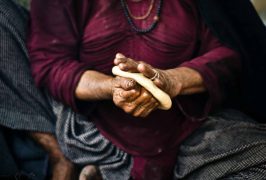
The Institute for the Advancement of Aboriginal Women (IAAW) and the Women’s Legal Education and Action Fund (LEAF) seek leave to intervene at the Supreme Court of Canada to advocate for justice for Cindy Gladue
June 29, 2018, Edmonton/Toronto – On Friday, June 29, IAAW and LEAF filed an application to intervene jointly at Supreme Court of Canada in Bradley Barton’s appeal of the Alberta Court of Appeal’s decision ordering a new trial in his charges for the murder of Cindy Gladue.
LEAF and IAAW intervened at the Court of Appeal to advocate for fairness and justice for Cindy Gladue, leading to a strong decision finding that Barton’s acquittal resulted from judicial error and the influence of discriminatory myths in the trial process. At the trial, the defence argued that Ms. Gladue, a Cree woman had consented to “rough sex” (rough enough to fatally injure her) and that her death was an accident.
Alberta Court of Appeal Decision
In IAAW and LEAF’s submission to the Court of Appeal, we argued that the trial judge erred in admitting evidence of Ms. Gladue’s sexual history into the trial and that he failed to properly instruct the jury on the law of consent. These judicial errors allowed prejudice to infect the trial proceedings, raising discriminatory myths about Indigenous women and consent based on sexual history. In addition, the judge failed to adequately inform the jury that consent to a given form of sexual touching does not extend to the use of any conceivable degree of force by one’s sexual partner.
LEAF and IAAW welcomed the Court of Appeal’s strong ruling recognizing that “myths and stereotypes continue to stalk the halls of justice in cases involving sexual offences” and the resulting “inequality falls most heavily on women since sexual assault has been, and continues to be, largely a gender-based crime.” We support wholeheartedly its statement that “the time has come to push the reset button for jury charges in this country for cases involving an alleged sexual assault.”
IAAW and LEAF’s Intervention at the Supreme Court of Canada
If granted leave to intervene, IAAW and LEAF will continue this advocacy and work to defend the important decision of Alberta’s highest court. We seek to ensure that the Supreme Court of Canada affirms that discriminatory myths and stereotypes about Indigenous women have no place in a criminal trial. The continuation of such myths distort the truth seeking process and undermine the pursuit of justice for Indigenous women and girls.
Further, if granted leave, IAAW and LEAF will argue that women have the right to consent, or withhold consent, not only to the sexual activity in question, but also to the degree of force used in that activity. LEAF Board Chair Lise Gotell states, “this issue is crucial to women’s substantive equality, including women’s safety and bodily integrity, and must be decided with equality principles in mind. Consent to a sexual act cannot constitute consent to that sexual act being applied with a level of force that can cause serious bodily harm or death. Such a finding would endanger women’s lives.”
Finally, we seek to illuminate the importance of the arguments and perspectives that groups like LEAF and IAAW bring to the justice system. The Appellant has used this appeal as an opportunity to challenge the role LEAF and IAAW played at the Alberta Court of Appeal and bring into question the role of interveners more generally. Without the participation of public interest intervener groups like IAAW and LEAF, the perspectives and interests of the groups of women we represent would not be heard. These perspectives are critical, given the normalization of violence against women, particularly Indigenous women and women exchanging sexual services for money. The participation of public interest groups like IAAW and LEAF is also particularly important in cases such as this one because Cindy Gladue, whose life circumstances situate this appeal, is deceased.
The dehumanization of Ms. Gladue epitomized by this trial is unavoidably connected to the fact that Indigenous women are disproportionately targeted for violence in Canada. In light of the treatment of Cindy Gladue, Angela Cardinal, and many others, IAAW and LEAF declared, “relations between Indigenous women and the criminal justice system are in crisis.” IAAW President Muriel Stanley Venne says “the dehumanization of Cindy Gladue and the violation of her body in the courtroom was a breaking point. We cannot tolerate this ongoing discrimination in our courts and we will continue our work to ensure the criminal justice system stops perpetuating violence against Indigenous women.”
LEAF and IAAW are grateful for the representation of Lisa Weber of Weber Law Group and Shaun O’Brien, LEAF’s Legal Director.
About the Institute for the Advancement of Aboriginal Women (IAAW)
For the past 20 years, IAAW has advanced the rights of Aboriginal women through advocacy, education, research and program development. IAAW is composed of First Nation and Metis Women dedicated to supporting other women in their journey to build individual and family capacity while supporting the development of healthy, safe and caring communities. For more information about IAAW, visit www.iaaw.ca.
About Women’s Legal Education and Action Fund (LEAF)
Since April 17, 1985, when equality rights were enshrined in sections 15 and 28 of the Charter of Rights and Freedoms, LEAF has worked toward equality for women and girls. LEAF intervenes in key cases to ensure that when courts interpret equality rights, there will be a systemic improvement in women’s lives. For more information about LEAF, visit www.leaf.ca.
***
For media inquiries:
Lise Gotell, Chair, LEAF National
789-297-0326, [email protected]
Muriel Stanley Venne, IAAW, President and Founder
780.887.3115, [email protected]
Julie Kaye, Research Advisor, IAAW
306-880-2910, [email protected]
